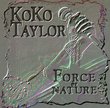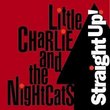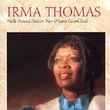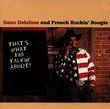| All Artists: Franz [Vienna] Schubert Title: Schubert: Fierrabras Members Wishing: 0 Total Copies: 0 Label: Dg Imports Original Release Date: 1/1/2001 Re-Release Date: 6/1/2001 Album Type: Import Genre: Classical Styles: Opera & Classical Vocal, Symphonies Number of Discs: 2 SwapaCD Credits: 2 UPCs: 028945950327, 0028945950327 |
Search - Franz [Vienna] Schubert :: Schubert: Fierrabras
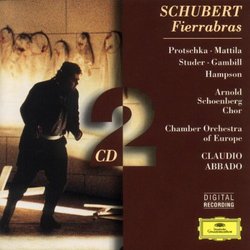 | Franz [Vienna] Schubert Schubert: Fierrabras Genre: Classical
|
Larger Image |
CD DetailsSimilar CDs
|
CD ReviewsA Really Good Romantic Opera Eric Bergerud | Albany, CA USA | 05/04/2004 (4 out of 5 stars) "I've been learning a few things about opera in the last few years. The most important is that the Wagner-disease that afflicted opera reviewers for 150 years has cost all of us a lot of good music. The Wagner-disease is easy enough to diagnose: it's symptoms are a belief that the libretto is coequal or even superior to the music. Music must be meaningful - beautiful just won't do - it might even be a handicap. So we've learned that baroque Italian operas were a waste until Gluck's "reforms." Bel Canto was nearly forgotten and wouldn't have been revived had it not been for Calas and Sutherland. Oh yea: Haydn's operas were a waste. Thanks to folks like Cecilia Bartoli we've found out that these opinions are rubbish. (Check out Bartoli & Hogwood's version of Haydn'd Orfeo: it's terrific.) We also know that Schubert couldn't compose for the stage. Judging from Fierrabras this is more rubbish. Let's get this out front - the libretto is a little silly. Something about Charlemagne. So what. The opera includes a great many splendid moments. In style and impact it reminds me very much of Weber's Freischutz or even Fideleo (another opera with a pretty lame story.) The orchestration is tuneful and vigorous - it was composed by Schubert after all. There is wonderful singing in every scene. Anyone with a taste for early romantic opera should get this work, particularly concerning the attractive price." Why Fierrabras and not Florinda? DAVID BRYSON | Glossop Derbyshire England | 08/23/2003 (5 out of 5 stars) "Other than being the only one of the heroes who finishes up without a girl, his is not even one of the most distinctive parts and he gets nothing to sing in Act II. Florinda is a more dramatic role than the rest put together despite not appearing in Act I. The basis of the plot is as follows:-Emma daughter of Charlemagne secretly loves Eginhard who is out of favour with her father who is at war with the Moors. In Charlemagne's victorious retinue is Roland who has captured Fierrabras son of the Moorish Prince Boland. Fierrabras secretly loves Emma since he met her in Italy 4 years previously. Roland secretly loves Florinda sister of Fierrabras after meeting her in Italy at the same time. Fierrabras is gutted to find that Emma loves Eginhard, but tries to protect their secret from Charlemagne who gets the idea that Fierrabras must have seduced Emma. Got all that? Oliver is also in Charlemagne's retinue but has only a minor part compared with Roland who is on no account to be confused with Boland. To my Anglophone ears Boland seems an odd name to come from that part of the world, but he is not alone in that -- the minor Latin epic poet Silius Italicus has a Carthaginian soothsayer called Bogus. Another intriguing touch is that Boland plans to burn his foes at the stake. I thought it was Christians who did that.In Act II some melodramatic, if not exactly dramatic, action gets going. It seems to have been Liszt who originally said that Schubert could not compose operas. I am not about to contradict the great man, but a more charitable view could see his statement as a bit of a sweeper. The very helpful liner notes say very sensibly that Fierrabras probably makes a good spectacular, and that combined with the music, which after all is not by just anyone, makes it perfectly viable on its own terms. Mozart or Verdi, born dramatists both, would probably have struggled to give individuality to the characters, and Schubert was only feeling his way in opera. I for one would certainly go to see it if I got the chance.The music is good without being exactly the greatest Schubert. Act I is mainly ensembles and you could well find some new favourite Schubert tunes among them if the score is new to you. Act II, as well as having some real action, starts with the best tune of all oddly prefaced with a single all-together-now chord, much the way Jimmy Shand and his Band used to start everything. The singing strikes me as very good without any of it being exceptional, and the recording ditto. In the last resort this is a major piece of out-of-the-way Schubert. I believe he had the greatest purely musical gift any man ever had, and he would surely have achieved things unthinkable, in this form as in the others, had he lived. The liner gives the first line of each number followed by a summary of the rest rather than the full libretto, which strikes me as admirably practical. So 5 stars and no nitpicking." Excellent performance of a rarely performed masterpiece L. Johan Modée | Earth | 03/28/2006 (5 out of 5 stars) "Schubert's operas have not received the attention that they actually deserve. This is even the case with Fierrabras, which is his major work for the genre. Conductors, directors, opera lovers, etc. - they have all rejected this work. For what reason? Well, the history is that the taste of the Vienna audience required Italian operas (i.e. Rossini); unfortunately at the time Schubert tried to get his masterpiece staged. As a result, it was first staged some 60 years after Schubert's death, and then by people who evidently prioritized some stereotyped idea of "opera" before the peculiar musical ideas of a master. In fact, the opera was not staged (nor recorded) unabridged before the Abbado 1988 live performance caught on this set. Thus it never became a part of the opera repertoire. I suppose this is the main reason for the rejection.
Fierrabras is a romantic opera. Perhaps the plot is not the very best, naive and melodramatic as it is - but the same goes for Beethoven's Fidelio, which has a classical status. In fact, if you can stand the plot of Fidelio, you will have no trouble with Fierrabras which is built on a similar conception. In contrast to Fidelio, however, one can note how well Schubert develops his intricate music around the characters - it is an early attempt to use "leitmotifs". So, arguably, the main feature of this work is the music itself, which is exceptionally fine and convincing. It contains some of Schubert's finest choral music, and many of its duets are wonderful compositions. Abbado's concentrated and beautiful interpretation, an excellent ensemble, the fine orchestral playing, and a fine recording contribute to the excitement. This set is clearly a better choice than the abridged Myto recording with Wunderlich, which is the only alternative as far as I know. The only drawback is that no texts and translations are provided, only a summary of the plot. Nonetheless, warmly recommended! " |

 Track Listings (19) - Disc #1
Track Listings (19) - Disc #1